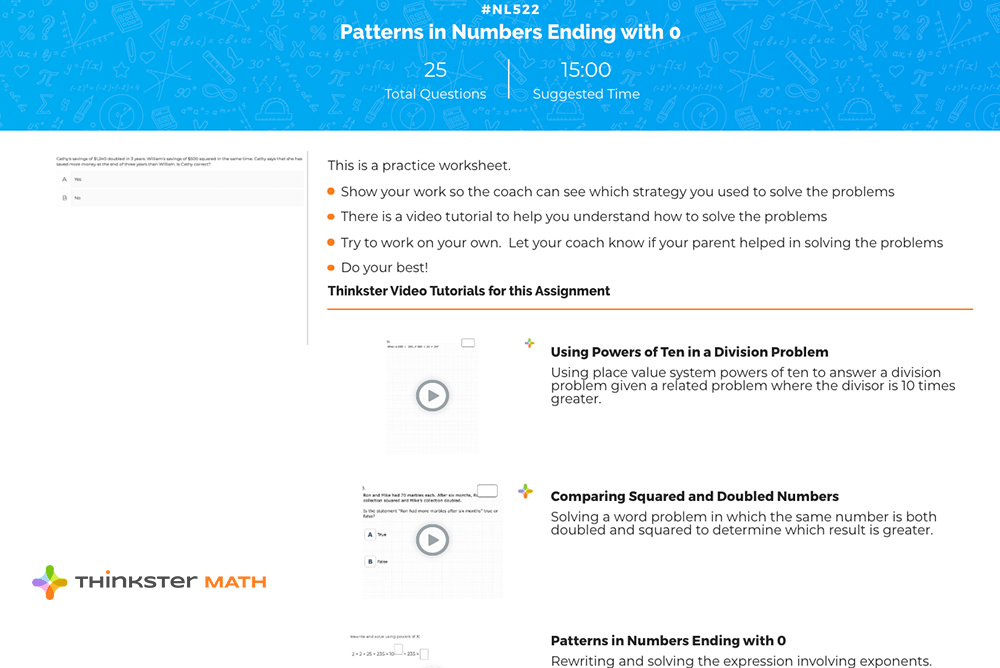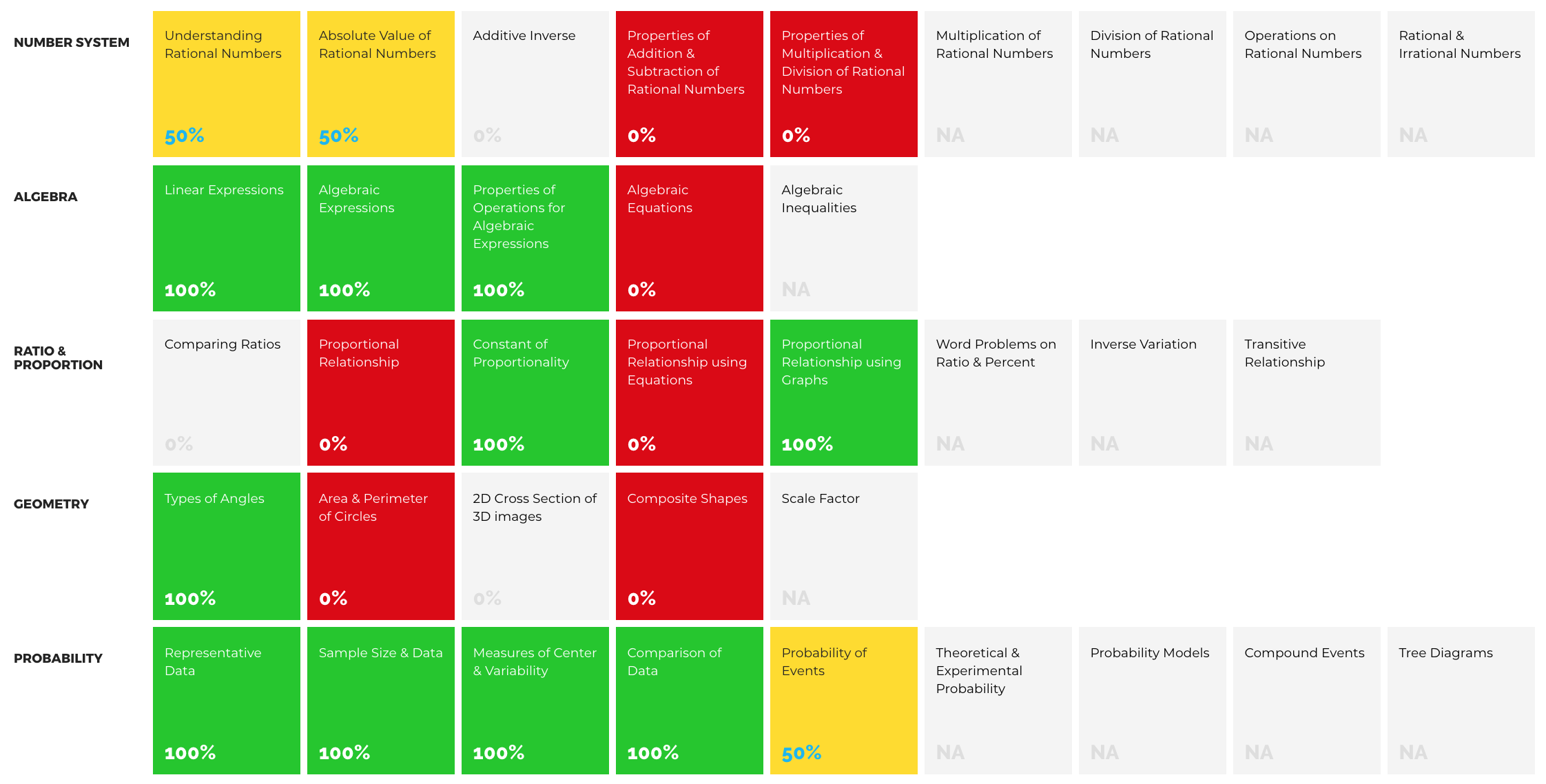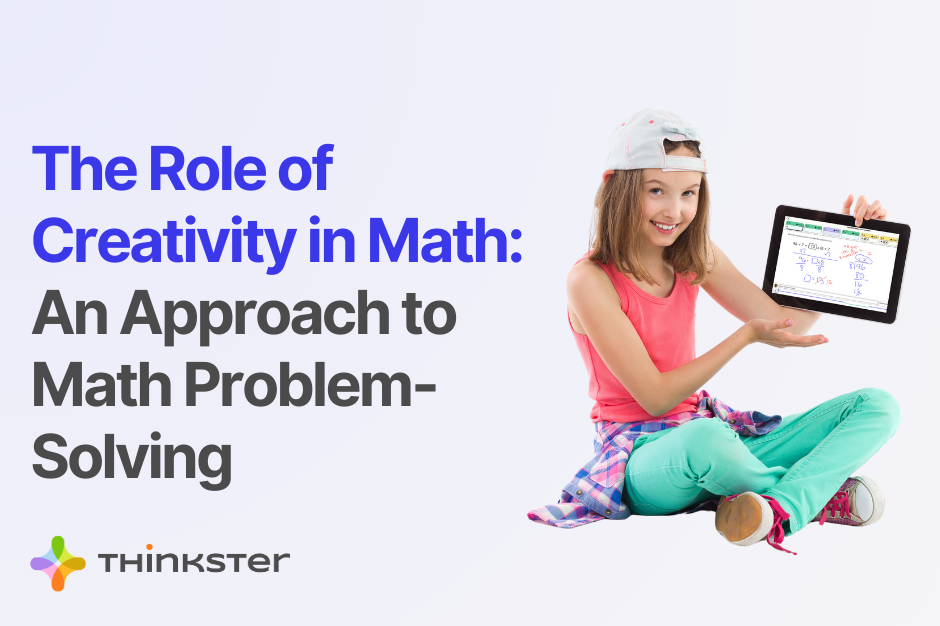

Last Updated on February 12, 2024
If you watch “Tidying Up with Marie Kondo,” you’re not just learning how to toss items that don’t spark joy.
If you start a bullet journal, you’re not just using pretty pens and calligraphy to draw in a planner.
Your brain is learning how to organize and prioritize.
This is an incredibly useful life skill that your child likely does not learn in school. A typical math tutor may not focus on or help with organizational concepts and skills either.
Once your child learns how to organize what they do and how they do it, they learn more effectively and efficiently.
We’re sharing 6 organizational skills your child’s math tutor should help develop, along with exactly how a Thinkster Math tutor helps nurture these topics!
In this article, we are going to zone in on the top organization skills that a tutoring program should include. At the end of the day, it is not enough for a student to simply learn concepts through repetition, they must have a way of organizing themselves for success in these areas.
Organization is a broad topic, which is why it is so important that students go about it the right way. Often, what parents may perceive as learning disadvantages are simply a result of a student feeling overwhelmed because they don’t know where to start.
Organizational skills can help students organize and prioritize what they need to do. A great tutor will provide these skills, and in this article, we’re going to outline the skills that the Thinkster math tutoring program will help your child develop.
After all, a math tutoring program shouldn’t stop at only teaching the concepts, it should cover how to apply these concepts as well.
Expectations from teachers and workload greatly increase as your child transitions to middle school and then high school.
You may notice that middle school or high school students start to struggle under the weight of homework, projects, quizzes, and tests. This is often because they are not sure how to effectively organize and plan their activities.
While their teacher may provide an agenda or planner, your child likely isn’t given a lesson on how to prioritize their assignments.
This is one organizational area where a private math tutor or coach can help!
A tutor helps your child understand how to use their planner to visually organize their tasks. After your child records their tasks in the planner, their tutor helps your child understand how to then prioritize completing those tasks.

Creating a learning plan is a great way for your child to learn how to organize their activities. They can create a daily or weekly plan that helps them progress through assignments and understand short and long-term goals.
As a Thinkster Math student, your child always has a clear understanding of their activities. When your child opens their Thinkster profile, they see the assignments they need to complete next and can visually differentiate practice assignments from tests.
Your Thinkster Math tutor also discusses the learning plan and expectations carefully with your child during their personal coaching sessions. This way, your child clearly understands their daily routine and what they complete that week.
It is not enough for a math tutor to just teach math skills and then assign work, they must also help students understand the best way to complete that work. This includes these key concepts of time management and prioritization of work.
With Thinkster, your child will grasp the nuances around managing and prioritizing assignments and activities — which then helps maximize their learning capacity and accelerate their learning.
Your child also needs to have strong time management skills for them to effectively prioritize and complete their tasks.
Your child may struggle with determining how much time to devote to one task. Or, if they have a science test and social studies project due the next day, which should they focus on first?
If your child has three hours to study for a test and complete a project, then they need to carefully divide that time. By designating one hour for test prep and two hours for their project, your child focuses on one activity during the specific time block.
Another area that a math tutor can help your child with is procrastination. Procrastination is a slippery slope if your child, especially if your child is notorious for putting off completing assignments, then panicking last minute when it’s due the next day.
Expert tutors can help your child develop a schedule and stick with it so that they understand and learn how to pace their assignments throughout the week. This helps keep them on track, especially as they move to high school and college and have many different courses to plan for!
As a Thinkster, your child learns how to work with segments of time when completing tasks.
Every assignment shows how many minutes our tutors recommend your child spends on it. We also share how many questions are in the assignment.

Your child can then determine how much time they should spend on each question to complete the assignment in the suggested time. For example, if a word problem assignment has a 15-minute recommendation and there are five questions, your child should recognize that they need to spend about three minutes per question.
This is an incredibly useful skill for your child to work on because it is actually setting them up for planning and time management success on time-driven tests!
When it comes to the SAT, standardized tests, or competitive tests, your child needs to carefully work through a block of time to complete their work. Working within a set time frame means that your child needs to shape their mind to work efficiently.
Part of this means that your child also needs to eliminate any stress or anxiety that they have in timed settings. If your child tells you that they get flustered taking tests, then have them start using a timer or clock when doing homework, projects, or other assignments. The goal is to have your child learn to pace themselves and not let a ticking clock cause any panic!
Successfully completing assignments within a time requirement is a skill that can be nurtured and improved on now! A math tutor can help your child identify the amount of time to spend on an assignment, then pacing their time and effort as they complete their work.
A math tutor helps your child develop time management skills by setting goals for completing assignments.
When your child can determine how much time activities or assignments should take, they can then work on learning to prioritize their own tasks. This is a particularly useful skill for students as they develop independent study skills.
When your child sits down to study for a test, they may think they need to spend an equal amount of time reviewing every question in the review packet.
This isn’t the best way to study.
Let’s say your child has a unit test on decimals coming up. On previous quizzes, they received 95% on decimal addition and subtraction, 82% on decimal multiplication and division, and 79% on decimal word problems.
Should your child spend equal time studying and reviewing these different concepts?
To study effectively, your child should learn to prioritize studying what they are weak in – decimal word problems.
It may be difficult for your child to examine their own proficiencies and pinpoint areas of weakness, but it’s important to develop this self-awareness. As a first step, your child should learn to vocalize when they need help.
For your middle school math student, is it operations on rational numbers? Linear algebra equations? Probability models?
Once your child identifies that they need help with algebraic equations, their tutor can then open up a discussion and they can work through the topic together.

After your child takes an assessment or unit test, they can visually see their results and their own matrix.
This is a great tool for your child to use when talking with their Thinkster Math tutor! Instead of trying to verbalize areas they are struggling with, they can refer to the chart and collaborate on a plan that leads to learning improvements.
The reality is that often students will actually avoid areas that they struggle with because it brings them too much stress. This is obviously a counterproductive strategy, as they should be working to build strength and confidence in these weak areas.
Thinkster will help students understand that by dedicating more time to these areas, they will become easier, and stress will reduce in the long run.
Your child should remember that failure and poor performance is not a bad thing. It just means there are opportunities to learn more and improve.

When your child is having trouble with an assignment, do they ask clear and concise questions or do they simply splutter out, “Help!”
Your Thinkster Math tutor is able to help your child subtly develop question organizational skills over time by refining how your child asks for help.
The ultimate goal is for your child to ask a question that has an active approach to math education instead of a passive one.
Here’s an example of a question with an active approach: “Can you help me understand how I get to the multiplication step when dividing decimals?”
One reason this question is much better than, “Help!” is because it shows your child first tried to put effort into trying to solve the problem.
The tone of the questions makes a big difference! “How do you do this?” often comes out as if your child wants someone to go through the problem and reveal the answer.
When your child uses clear and concise questions and explains how or why they need help, they are showing their tutor that they tried to work independently.
A math tutor can work with your child to ensure they when they communicate, they specify the step in the problem where they are having trouble continuing to solve it.
Your child also learns to prioritize and organize their questions. Since they work with their Thinkster tutor for a set amount of time, your child learns to prepare key questions that they have for the session.
This skill is so helpful because it helps students get help with specific challenges they need help with when they are solving math problems rather than simply asking for the entire solution to a math problem before even attempting it.
This skill is also useful in future professional settings or everyday interactions.
The internet is full of lists, like, “The Top 12 Questions to Ask At the End of An Interview” or “The Top 5 Questions to Ask a Realtor”, which all hint at the same thing:
You want to make sure you prepare questions that are clear and concise before you communicate with another person!
Communication skills are considered one of the most important skills for professional success, especially if you want your child to become a leader in the workplace!
To effectively interact with people, your child should begin organizing the types of communication to use in different settings and relationships.
For example, the way that your child speaks with a younger sibling is extremely different from how they will speak with their future manager!
In middle school and high school, learning how to communicate appropriately with different individuals or groups isn’t typically discussed.
Some of our Thinkster tutors find that their students initially struggle with how to appropriately address messages. A message like, “This assignment is stupid!” indicates your child is frustrated with the assignment, but there are better ways to get their point across!
Imagine your child sent, “This report is stupid!” to their future employer.
Yikes!
There are two things contributing to the problem. One, your child likely hasn’t had a lesson on how to construct emails or messages to teachers, professors, or employers. Two, your child is used to the highly casual tone they use in texts and on social media.
A tutor can help guide your child on how to respectfully ask questions or send messages.

Now is a great time to instill positive communication habits before they become tricky habits for your child to break in the future.
All forms of communication or messages that your child sends to their tutor should be clear and respectful. Phrasing messages or emails politely and cordially is something that your child takes with them to high school, college, and their future workplace!
Last on our list, you want to find a math tutor that helps your child organize the required effort on a task. This is something that actually ties into many of the other organizational skills already shared!
Organizing effort means that your child considers their persistence when developing skills over a period of time. For your child to show growth, they need to work routinely and consistently.
Taking a step back from math, imagine your child is eager to join the middle school soccer team.
In preparation for tryouts, your child first organizes the activity (practicing and preparing for tryouts) and their time around the activity (thirty minutes).
Next, your child consistently practices (every day at 4 PM) and organizes their efforts carefully. If they can dribble the ball up the field, they should focus on practicing other skills that need more work.
By prioritizing the areas that they need to put the effort in, they recognize which specific areas require more focus, dedication, and time to make improvements. This focus needs to be consistent for them to realize results as well.
Along with consistency, your child needs to be pushed to work on areas that are not in their comfort zone.
If your child is working only on skills they have already mastered, it’s going to require little effort and they are not going to learn anything new.
This is why it’s important that they try new and different things – especially things that they think are difficult! There is a chance that they are going to fail at the task, but failure is a good thing! This is when big learning moments happen!
Thinkster math tutoring programs allow your child to understand that long-term sustained effort is rewarded. And although it is difficult, the results they see make it worthwhile.
When pushed to work in areas that are out of their comfort zone, your child is going to work on tasks that require more time, persistence, and consistency. This is why they need to understand how to organize their mind carefully and prioritize where they put their efforts.
It’s just a fact that frustration comes along with learning anything. Picking up a new skill can be complicated, and it might feel like you are making no progress, which can make you upset.
This is why, as a bonus method of organization, Thinkster will help students to organize their frustration!
By providing all of the methods of organization above, and allowing students to organize their time and effort so that they are able to efficiently learn and develop skills, students will find that their learning frustration is minimized as well.
Thinkster helps students focus on positive areas of improvement, and allows students to ask questions and seek clarification when needed. This continuous, positive progress keeps the frustration away and keeps students on the right track.
Of course, the best amount of frustration is no frustration at all, but we all know that out of frustration comes real learning opportunities.
A Thinkster instructor understands that these are difficult subjects and that is why enabling students to get better organized makes them more productive.
Tutors understand that math it is difficult, and work with math students to address these areas. Frustration can become a motivator toward growing their knowledge in a more efficient way – using the organizational skills explored above.
It’s important for your child to learn to organize their mind so that they think and learn effectively and efficiently.
Many math tutors typically do not focus on developing this skill, which is why you should look for a tutor that helps your child with organizing these areas:
These six organizational skills help your child become a world-class student and thinker. They are able to organize and compartmentalize their mind as they tackle questions and learn new concepts.
Organization is really just about recognizing what is important and dedicating time to solving it efficiently. Thinkster teaches students these skills and gives them the tools to organize efficiently on their own. What you really want from a tutoring program are the tools for your child to go forward and expand their knowledge independently. This is what great organization skills can do!
If your child can master these skills, then they are also on the path to becoming an incredibly successful future leader, innovator, or entrepreneur. Great leaders and creators have a clear vision in their minds that they bring to fruition and reality. By introducing your child to organization and prioritization now, they are developing their minds to unpack problems systematically and efficiently.
A Thinkster Math tutor is ready to help your child develop these skills. Get started for free today at hellothinkster.com.
Which organizational skill do you think your child struggles the most with?


